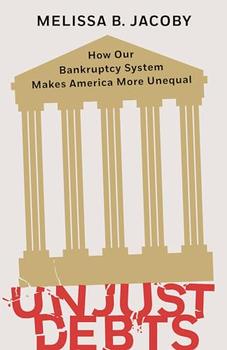
How Our Bankruptcy System Makes America More Unequal
by Melissa B. Jacoby
A groundbreaking look at the hidden role of bankruptcy in perpetuating inequality in America, from an expert in the field
Bankruptcy is the busiest federal court in America. In theory, bankruptcy in America exists to cancel or restructure debts for people and companies that have way too many—a safety valve designed to provide a mechanism for restarting lives and businesses when things go wrong financially.
In this brilliant and paradigm-shifting book, legal scholar Melissa B. Jacoby shows how bankruptcy has also become an escape hatch for powerful individuals, corporations, and governments, contributing in unseen and poorly understood ways to race, gender, and class inequality in America. When cities go bankrupt, for example, police unions enjoy added leverage while police brutality victims are denied a seat at the negotiating table; the system is more forgiving of civil rights abuses than of the parking tickets disproportionately distributed in African American neighborhoods. Across a broad range of crucial issues, Unjust Debts reveals the hidden mechanisms by which bankruptcy impacts everything from sexual harassment to health care, police violence to employment discrimination, and the opioid crisis to gun violence.
In the tradition of Matthew Desmond's groundbreaking Evicted, Unjust Debts is a riveting and original work of accessible scholarship with huge implications for ordinary people and will set the terms of debate for this vital subject.
"Jacoby's assured prose brings extraordinary clarity to an intentionally opaque and labyrinthine system. It's an eye-opening look at the laws that undergird American inequality." —Publishers Weekly (starred review)
"An exposé of the racial, class, and corporate biases in the U.S. bankruptcy system...[Unjust Debts] is deserving of wide readership." —Kirkus Reviews
"Unjust Debts synthesizes three decades of research into the system's frustrating contradictions, helpfully summarizes the crux of the issue as bankruptcy's 'structural bias in favor of artificial persons'—i.e., corporations, nonprofits, and constructed entities explicitly designed to shield rich and powerful owners from the consequences of their misdeeds." —The American Prospect
"Unjust Debts throws open the doors and windows to the bankruptcy system so readers can see for themselves how this law works and doesn't work for the real people it so profoundly affects." —Beth Macy, New York Times bestselling author of Dopesick and Raising Lazarus
"Melissa Jacoby's Unjust Debts takes on the gross inequality that victims face every day in mass tort cases. If we can't grasp the magnitude of the problem, we'll never be able to fix it. The American bankruptcy system is fundamentally broken and every policymaker in America should be reading this book." —Ryan Hampton, addiction recovery advocate and bestselling author of American Fix and Unsettled
"What is the foundation upon which inequality in America is built? We have come to understand so much of that hidden architecture in recent years—and now, in Unjust Debts, Melissa Jacoby brilliantly unearths one of the largest, and least-understood building blocks." —Michael Eric Dyson, Vanderbilt University, and New York Times bestselling author of Tears We Cannot Stop
This information about Unjust Debts was first featured
in "The BookBrowse Review" - BookBrowse's membership magazine, and in our weekly "Publishing This Week" newsletter. Publication information is for the USA, and (unless stated otherwise) represents the first print edition. The reviews are necessarily limited to those that were available to us ahead of publication. If you are the publisher or author and feel that they do not properly reflect the range of media opinion now available, send us a message with the mainstream reviews that you would like to see added.
Any "Author Information" displayed below reflects the author's biography at the time this particular book was published.
Melissa B. Jacoby is the Graham Kenan Professor of Law at the University of North Carolina at Chapel Hill. A frequent commentator on bankruptcy and debt in national media outlets, she has published over fifty articles, book chapters, and op-eds. She lives in Chapel Hill, North Carolina, and Brooklyn, New York. Unjust Debts: How Our Bankruptcy System Makes America More Unequal (The New Press) is her first book. Find her at mbjacoby.org.




To be ignorant of what occurred before you were born is to remain always a child
Click Here to find out who said this, as well as discovering other famous literary quotes!
Your guide toexceptional books
BookBrowse seeks out and recommends the best in contemporary fiction and nonfiction—books that not only engage and entertain but also deepen our understanding of ourselves and the world around us.